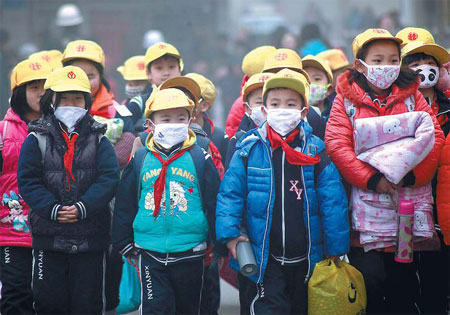IN BRIEF (Page 2)
Updated: 2013-01-18 09:05
(China Daily)
|
|||||||||||
|
Primary school students in Jinan, capital of Shandong province, prepared to ward off the flu. Zheng Tao / for China Daily |
Health
Officials issue flu-shot warning
Health specialists have urged more people to get flu shots this winter, as the killer virus continues to sweep the country.
Although influenza cases are "well within the normal range compared with last year", China's top health specialist Shu Yuelong warned that the number of people receiving vaccinations is still far lower than international levels, potentially putting lives at risk. Only about 2 percent of people on the Chinese mainland get flu shots each year, the director of the National Influenza Center, under the Center for Disease Control and Prevention, said on Jan 15.
A total of 360 cases of H1N1 flu were reported between Dec 1 and Jan 6, including two people in Beijing who died. Shu warned that outbreaks will last into March, "which might mean more deaths, particularly among children and the elderly," the most vulnerable groups. H1N1 and H3N2, the two most prominent flu strains this season, may have even claimed more lives, he said.
Transport
New airport cleared for takeoff
The State Council has approved the construction of a new international airport in the Chinese capital, Beijing airport spokesman Li Shengbo said on Jan 13. Li, however, declined to give further details, such as when construction would start or on the looks of the new airport.
The rapidly increasing number of passengers has forced the existing international airport in Beijing to run at near-full capacity, said Liu Weimin, a professor of Civilian Aviation Management Institute of China. A second airport is needed to divert passenger flow, he said.
Beijing Capital International Airport has been ranked as the world's second-busiest airport for three consecutive years.
According to CAAC News, a newspaper affiliated with the aviation administration, large-scale construction will begin next year, and the airport is due to open before the end of 2018.
Policy
Visa for 5 years to be on offer
Multiple-entry visas, valid for up to five years, will soon be on offer in a bid to attract more top talent. The Exit and Entry Administration Law, which comes into effect in July, will also introduce a six-month visa for short-term hires.
Zhang Jianguo, director of the State Administration of Foreign Experts Affairs, said on Jan 15 that foreigners must already be employed to apply for the visa. "We hope the visas will encourage more international experts to work here," Zhang said. He declined to elaborate on the eligibility criteria.
Liu Guofu, an immigration law specialist at Beijing Institute of Technology, said the government is targeting key groups with the new visas. These include candidates with management experience at leading multinationals, specialists in education and science-related fields and renowned figures in culture and sport.
Family planning policy unchanged
China will stick with its current family planning policy to maintain the country's low birthrate but will make an effort to fine-tune it, the country's population planning chief said. Wang Xia, minister of the National Population and Family Planning Commission, made the remarks at a national conference in Beijing on Jan 14 amid widespread speculation that the one-child policy on the Chinese mainland might soon be relaxed.
Maintaining a low birthrate will still remain a top priority for the government this year and beyond. Local situations will, however, be considered before the policies are implemented, she said.
China has maintained a low birthrate for about 20 years. Many people, including academics, have called for the policy to be relaxed to better meet new demographic challenges such as a rapidly aging society, a skewed gender ratio and rising labor shortage. But others said the country's current low birthrate is not stable and would rebound sharply if the family planning policy were to be abandoned.
Trade
Netherlands tuning into technology
High-tech goods exports from China continued to maintain their strong position with the nation accounting for the largest chunk of such products imported by the Netherlands last year, according to an embassy official. China looks set to maintain this position for the next few years, the official said.
The Netherlands is home to Europe's largest port, Rotterdam, and has a proud trading tradition, and China is playing an important role in fostering trade relations, said Li Fei, economic and commercial counselor at the Chinese embassy in The Hague. "Made in China no longer means cheap and low-quality products."
Li cited figures from Statistics Netherlands, a government body that compiles information about the country.
In 2011, China zoomed past Germany and the US to become the largest source of high-tech products imported by the Netherlands. More than half of China's exports to the Netherlands are high-tech products, mainly laptops and mobile phones, Li said.
China Daily
(China Daily 01/18/2013 page2)
Today's Top News
Police continue manhunt for 2nd bombing suspect
H7N9 flu transmission studied
8% growth predicted for Q2
Nuke reactor gets foreign contract
First couple on Time's list of most influential
'Green' awareness levels drop in Beijing
Palace Museum spruces up
Trading channels 'need to broaden'
Hot Topics
Lunar probe , China growth forecasts, Emission rules get tougher, China seen through 'colored lens', International board,
Editor's Picks

|

|

|

|

|

|






